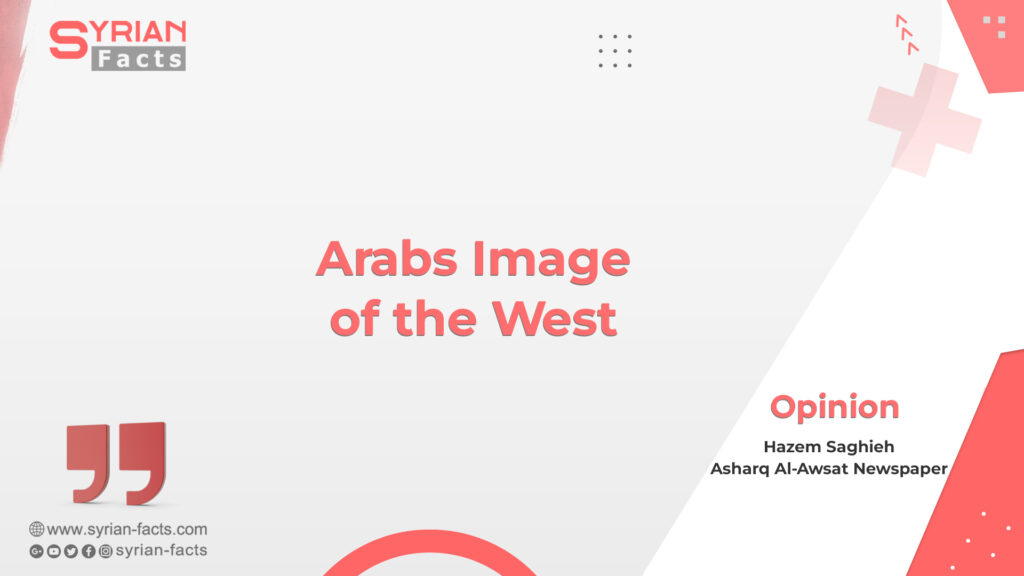The Arabs’ image of the West is not external. When they voice opinions about China, Africa, or Russia, these opinions pertain to those countries and continents alone; they therefore do not imply a challenge to or judgment of themselves, nor does it imply an implicit comparison or a standard that is taken as reference.
With the European and American West, it is a different matter. We talk about it as though we are talking about ourselves, albeit circuitously. There are two main and intertwined reasons for this: First, Western countries had colonized or had imposed mandates on us after inheriting much of what used to be the Ottoman Empire when it collapsed just over a century ago. Once we gained independence, we chose one of two approaches for dealing with the West and its countries: the few opted for maximalist friendship with them, and the many opted for maximalist enmity. Western support for the State of Israel (though the communist East also supported it) crystalized the negative sentiments held by the Arabs. In either case, however, the stance remained impervious to scrutiny, nuance, and follow-up.
In turn, the second reason is related to the centrality of the West in creating the modern world, which, of course, includes the modern in us. And through its influence on the modern, it also had an impact on everything we had of old – an old that felt a certain unease that stretches from being provoked to feeling besieged and encircled.
This is how our intellectuals’ famous inquiries in the Westerners’ progress and our backwardness, the “secret” to the West’s ascendancy, and other matters that were not asked regarding our links to other nations and peoples, proliferated early on.
However, while our stance on the West was a reason for the divergence between admirers of its model, and sometimes its policies, and those who despise it, both positions were premised on a conception of the West in which the external completely trumps the internal. The concerns of its haters were centered primarily around its foreign policy, especially towards our region. As for its admirers, they were only interested in the results – the fruits and forms of Western progress – and they did not show an interest in the reasons for them or the paths it took to reach its current stages.
Thus, reading a book and watching a movie or play remained incomplete and, in a sense, vocational – these acts were rarely tied to the broader experience that the book or artwork addresses or emanates from.
The most prominent contradiction here is between our internal and intimate relationship with the West on the one hand and our external knowledge of it on the other. The dynamics of its development, its economic system, the history of its institutions, its ideas, and its conceptions regarding the relationship to the body, sex, and other matters did not receive the attention they deserve. And this was before Orientalism Studies added the formula of “we don’t want them to know us” to “we don’t want to know them.”
The fact is that its value system, in its history and struggles, was and remains the biggest victim of our ignorance of the Western interior or the deep West, so to speak. Many factors exacerbated the crisis of our inability to recognize these values, including the dissonance between the Western countries’ foreign policy and the politics of values, especially during the Cold War. Indeed, it was during this era, when its bitter competition with Communism was prioritized, that most countries of the “Third World” gained their independence and began exploring politics and international relations. This made it easier to read the West with non-Western eyes that see all powers as supplements to political power. Thus, things written in the media, or an individual burning the Quran, for example, are seen to reflect state policy around which there is a national consensus.
In addition to the frailty of our democratic tradition, the misfortunes of democracy – which regulates the implementation of those values – in our part of the world weakened these values themselves. As a result, every regression of democracy in the democratic camp seems like something of a prize awarded to us, or a recognition that we are right and that we are certainly not defeated politically nor bogged down morally. On the other hand, the conflicts between the countries of the “Third World,” despite their abundance, are rarely concerned with values, which occupied only a secondary position or were manipulated for propaganda purposes, if they played any role at all.
If we were to delve deeper we would perhaps find that the sentimental narrative of unity that colors how we see our history and present contrasts with the conflictual character of Western history and the central position that disputes over rights occupy within it. Indeed, Western history pits women against men, workers against employers, and atheists against the faithful… While it is easy to condemn this discordance when it is coupled with Communism (and atheism), neutral particularities, natures, education, and morals become the basis and grounds for condemnation when it is coupled with capitalism.
And while both those drawn to the policies of the West and those who are not share similar positions regarding this system of values, neither takes the time to look into this value system’s history and the history of the splits around it in the West itself, preferring to see and engage with it as a rigid and final system that is everything our rigid and final value system is not.
In light of political turbulence and authoritarian aspirations, the accumulation of these elements has increased our control over how images are created, making the object stronger than its maker. And unfortunately we are going further and further along this path…
Asharq Al-Awsat Newspaper





Be the first to write a comment.